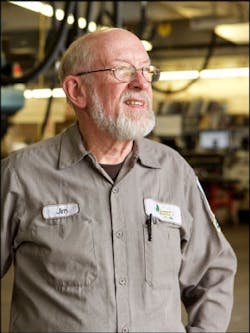On Feb. 17, 2015, Jim Houser sat in front of the Oregon House of Representatives, arguing the legislature should extend Oregon's Clean Fuels Act.
"The Clean Fuels Program is a well-designed, market-based program that will spur economic activity while safeguarding businesses,” Houser said.
It’s been a long road, but Houser is still locked in the fight he started over 30 years ago, when he took over Hawthorne Auto Clinic and inherited a large Dumpster from the shop’s worn-out former owner.
Back in January of 1983, that Dumpster, two yards wide and filled to the brim with oil filters and scrap metal, was a physical representation of the past, of an auto care industry professional incapable of keeping up with an ever-evolving business.
“He was actually overwhelmed by the automotive technology of 1983, and we were really excited,” Jim says. “We wanted something for ourselves, so we jumped at the chance.”
Jim and his wife, Liz, looked at that Dumpster resting outside the Portland shop and saw possibility for the future of auto care. They saw a business that had a poor image with the public; that was struggling when it came to its environmental practices; that needed a green-powered jolt to get motivated to take the next step.
Hawthorne Auto Clinic
Location: Portland
Owner: Jim & Liz Houser
Size: 5,000 square feet
Staff: 11 (5 technicians, 2 owners, 2 service consultants, 1 student intern, 1 facilities maintenance worker)
Average Monthly Car Count: 290
Annual Revenue: $1 Million
Just one year into their reign at Hawthorne, Jim and Liz had implemented green practices they learned through a local recycling program. By makeshifting a plywood bin for cardboard recycling, consolidating their oil storage and revamping their personal recycling methods, they were producing less waste without adding costs—in fact, they were growing rapidly.
Jim says people responded to his business’s growing environmental presence in Portland.
“You can set yourself apart and distinguish yourself, and with many consumers, that puts you a step ahead,” Jim says. “They're looking at everyone who gets good reviews for good prices, good quality, good customer service, but if there's a shop that's a cut above in terms of their environmental practices, that’s a marketing plus.”
As Jim and Liz’s growth progressed into the 1990s, they saw an opportunity to not only rectify their own shop’s previous environmentally unfriendly ways, but also help do the same for every auto shop owner around them, as well.
AN IMAGE PROBLEM
As far as Jim is concerned, the auto care industry still has a long way to go to fix its carbon footprint. While he sees rapid change all around him, he knows that, deep down, auto shops have an image problem among consumers.
“I was raised in an automotive family. I’ve talked to a lot of people in the industry, and I’ve seen a lot of transactions, and I know that we don't have, generally speaking, a really good image in the American public's mind,” Jim says. “I think our image is important. I think that we do need to work on that, both in terms of our ethics, but also our environmental practices.”
Along with his automotive education, Jim grew up working with a recycling program at a local auto repair cooperative shop. Sunflower Recycling Cooperative, Jim says, was the first curbside recycling business in the U.S., picking up recycled materials on a scheduled route years before other U.S. cities started the practice.
Jim was inspired to carry on Sunflower’s legacy, which ended after a few years because there was no money to be made in the noble cause. So, after he and his wife turned Hawthorne Auto Clinic into an environmentally friendly and profitable business, they set their sights on the entire state of Oregon.
In 1995, Jim teamed up with three other auto shops in the area who were leaders in environmental practices, and joined forces with several local and state agencies, including the Oregon Department of Environmental Quality, the Portland Bureau of Environmental Services, Washington County’s Clean Water Services, and the Automotive Service Association, to establish a green certificate that auto repair shops could obtain by establishing sustainable, environmentally friendly practices for day-to-day operations.
The goal of the Eco-logical Business certification (EcoBiz), Jim says, was to completely revamp the auto repair industry’s image in Oregon and to prove that shops that generate small quantities of hazardous materials that were conditionally exempt from environmental regulation by law could be every bit as diligent and mindful of the environment as a large-quantity generator. By regulating themselves, Jim says the industry could show it cared about the larger picture.
“Mostly they were things that small-quantity generators and large-quantity generators were required to do. We looked to see which of those things could reasonably be done by an auto shop by just being more mindful and making some practical changes and by purchasing some products,” Jim says. “So there were certain things that were going to be required to be certified, and then there was a list of electives, and if you did 80 percent of these electives, you could also complete the portfolio.
“And the real exciting part was we got zero pushback, and how quickly other shops were buying in.”
THE ECOBIZ CERTIFICATION
Actually forming the certification came easy at first—as the Housers were turning their shop around financially, they were also implementing innovative green practices, such as installing solar panels and revamping their recycling system. Jim and his shop partners did plenty of research on similar environmental certification programs, but they also incorporated their own practices to pertain specifically to auto shops.
Working with the local agencies, the team was able to produce not only an extensive list of requirements for the EcoBiz certification, but also coordinated when and how each agency would observe and evaluate a shop to receive the certificate.
Immediately, he says six businesses signed up to be EcoBiz certified. Before long, the various agencies were scheduling time with shops to help implement practices that prevented and reduced air, water and hazardous waste pollution.
At first, the requirements were simpler, reflective of laws regulating large-quantity producers of hazardous waste. But the potential reach of the program stretched further as EcoBiz teamed up with more and more agencies.
“So things like secondary containment,” Jim says. “Anything that holds over 55 gallons of oil or antifreeze or anything potentially hazardous. If you're a large-quantity generator, you have to have that barrel in some way contained so if it starts to leak, it doesn't get into the storm or floor drain or into the public water system.
“So we found this company called New Pig that makes different kinds of very reasonably priced products to help meet that standard. They build them for larger companies, but they really weren't that expensive. So we were able to put together a toolkit of products that would be able to meet these standards.”
Other regulatory items included revamping a shop’s recycling system, such as using both sides of printer paper and recycling scrap metal; annually training employees on how to properly store supplies and reduce waste; properly labeling and storing hazardous waste containers; implementing a procedure for spill prevention; and inspecting shipments for leaks and damages.
Soon the Environmental Protection Agency took note of EcoBiz’s process and not only provided some funding, but actually provided personnel to go shop to shop, pitching the service. In fact, the EcoBiz certification, which is updated every five years to continually push the auto care industry further along, eventually required regulations that went beyond the EPA’s requirements.
“For air-conditioning, in order to be certified, you can't just add refrigerant to a system that's low,” Jim says. “You have to test the system, and if it has a leak, you have to evacuate the system—which the EPA isn't willing to do. As far as the EPA is concerned, you can just go ahead and charge the system, but to be certified in our system, if you find the leak, you have to evacuate it.”
Going above and beyond what’s required, Jim says, has helped give the EcoBiz certification a level of prominence when hung on an auto shop’s wall.
GREENER IN OREGON
To this day, more than 130 Oregon shops have achieved the EcoBiz certification. In fact, the certification’s reach has extended to car washes, radiator shops and, most recently, landscaping companies—another large producer of hazardous wastes.
Above all, Jim says he and Liz are most proud to not only have improved the auto care industry’s image in Oregon, but also to have banded those small businesses together for one large noble cause.
“I think it's important for my wife and I personally for how we view the world,” Jim says. “We came into this just wanting to make a different. There’s no money to be made with this certification. These are all agencies doing this work, helping these shops. It’s all for something bigger than us.”
It all started with a small little shop named Hawthorne Auto Clinic, a shop with an excess of waste and unsustainable practices that Jim and Liz ultimately remedied—and then continued to do throughout the state.
Oh, and that two-yard-wide Dumpster? Jim and Liz swapped it out for a quarter-of-a-yard wide Dumpster—and they don’t really use it that often.
“Just little by little, one thing at a time, we turned that shop around,” Jim says. “We didn't do everything the first month, but we put all those things into practice, and by the end of the year, we had grown. Now, 30 years later, we’re pushing ourselves further. It was a challenge we gave ourselves then and a challenge we still pursue today.”

